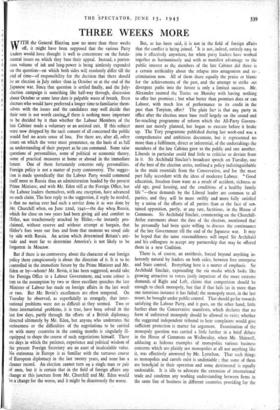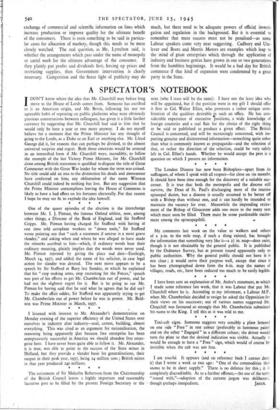THREE WEEKS MORE
WITH the General Election now no more than three weeks off, it might have been supposed that the various Party leaders would have thought it well to concentrate on the funda- mental issues on which they base their appeal. Instead, a porten- tous volume of ink and lung-power is being aimlessly expended on the question—on which both sides will resolutely differ till the end of time—of responsibility for the decision that there should be an election in July rather than in October or at the end of the Japanese war. Since that question is settled finally, and the July- election campaign is something like half-way through, discussion about October or some later date is palpable waste of breath. Even electors who would have preferred a longer time to familiarise them- selves with the issues and the candidates may well decide that their vote is not worth casting.if there is nothing more important to be decided by it than whether the Labour Members of the late Cabinet made a voluntary or an assisted exit. If this subject were now dropped by the tacit consent of all concerned the public would feel no acute sense of loss. For there are, after all, other. issues on which the voter must pronounce, on the basis of as full an understanding of their purport as he can command. Some raise questions of personalities, some of political or economic theory, some of practical measures at home or abroad in the immediate future. One of them fortunately concerns only personalities. Foreign policy is not a matter of party controversy. The sugges- tion is made sporadically that the Labour Party would commend itself more to Russia than an administration headed by the present Prime Minister, and with Mr. Eden still at the Foreign Office, but the Labour leaders themselves, with one exception, have advanced no such claim. The best reply to the suggestion, if reply be needed, is that no nation ever had such a service done it as was done by Mr. Churchill when, on June 22nd, 1941—the day when Russia, which for close on two years had been giving aid and comfort to Hitler, was treacherously attacked by Hitler,—he instantly pro- claimed, without reserve and without attempt at bargain, that Hitler's foes were our foes and from that moment we stood side by side with Russia. An action which determined Britain's atti- tude and went far to determine America's is not likely to be forgotten in Moscow.
But if there is no controversy about the character of our foreign policy there conspicuously is about the direction of it. It is to be controlled in the immediate future by the Prime Minister and Mr. Eden or by—whom? Mr. Bevin, it has been suggested, would take the Foreign Office in a Labour Government, and some colour is lent to the assumption by two or three excellent speeches the late Minister of Labour has made on foreign affairs in the last week or two. But Mr. Bevin's excellences are often tempered. On Tuesday he observed, as superficially as strangely, that inter- national problems were not as difficult as they seemed. Two or three international problems, it is true, have been solved in the last few days, partly through the efforts of a British diplomacy directed ultimately by Mr. Eden, but anyone who underrates the seriousness or the difficulties of the negotiations to be carried on with many countries in the coming months is singularly ill- equipped to shape the course of such negotiations himself. These are days in which the patience, experience and political wisdom of the present Foreign Secretary are an asset of incalculable value. No statesman in Europe is as familiar with the tortuous course of European diplomacy in the last twenty years, and none has a cleaner record. An election cannot turn on a single man or pair of men, but it is certain that in the field of foreign affairs- any change at this juncture from Mr. Churchill and Mr. Eden would be a change for the worse, and it might be disastrously the worse.
a
But, as has been said, it is not in the field of foreign affairs that the conflict is being joined. • It is not, indeed, entirely easy to join it effectively anywhere, for when party leaders have worked together as harmoniously and with as manifest advantage to the public interest as the members of the late Cabinet did there is a certain artificiality about the relapse into antagonism and re- . crimination now. All of them share equally the praise or blame for the achievements of the past, and the attempt to strike out divergent paths into the future is only a limited success. Mr. Alexander taunted the Tories on Monday with having nothing to offer but promises ; but what better than promises does or can Labour, with much less of performance to its credit in the past than Toryism, offer? The plain fact is that any party in office after the election must base itself largely on the sound and far-reaching programme of reform which the All-Party Govern- ment not merely planned, but began to execute before it broke up. The Tory programme published during last week-end was a comprehensive and ambitious document, but it represented no more than a fulfilment, direct or inferential, of the undertakings the members of the late Cabinet gave to the public and one another. Liberals in particular could find little to criticise or deviate from in it. Sir Archibald Sinclair's broadcast speech on Tuesday, one of the best of the election series, outlined a policy indistinguishable in the main essentials from the Conservative, and for the most part fully accordant with the ideas of moderate Labour. "Good education, freedom from want as a result of accident, sickness or old age, good housing, and the conditions of a healthy family life "—these demands by the Liberal leader are common to all parties, and they will be more swiftly and more fully satisfied by a union of the efforts of all parties than in the face of sus- taMed opposition, partly, at any rate, factitious, in the House of Commons. Sir Archibald Sinclair, commenting on the Churchill- Attlee statements about the date of the election, mentioned that he personally had been quite willing to discuss the continuance of the late Government till the end of the Japanese war. It may be hoped that the same reasonableness will impel Sir Archibald and his colleagues to accept any partnership that may be offered them in a new Coalition.
There is, of course, an antithesis, forced beyond anything in- herently natural by leaders on both sides, between free enterprise and State control. Everything here is a matter of emphasis. Sir Archibald Sinclair, expounding the via media which looks like growing attractive to voters justly impatient of the more extreme demands of Right and Left, claims that competition should be enough to check monopoly, but that if that fails (as in more than one notorious instance it has failed) the monopoly must, in the last resort, be brought under public control. That should go far towards satisfying the Labour Party, and it goes, on the other hand, little further than the Conservative manifesto, which declares that no form of unfettered monopoly should be allowed to exist; whether the suggested independent tribunal to hear complaints would give sufficient protection is matter for argument. Examination of the monopoly question was carried a little further in a brief debate in the House of Commons on Wednesday, when Mr. Shinwell, adducing as hideous examples of monopolies various business concerns which are plainly not monopolies at all nor anything like it, was effectively answered by Mr. Lyttelton. That such things as monopolies and cartels exist is undeniable ; that some of them are beneficial in their operation and some detrimental is equally undeniable. It is idle to advocate the extension of international trade and condemn any working understanding between firms in the same line of business in different countries providing for the exchange of commercial and scientific information on lines which increase production or improve quality for the ultimate benefit of the consumers. There is even something to be said in particu- lar cases for allocation of markets, though this needs to be more closely watched. The real question, as Mr. Lyttelton said, is whether the arrangements which pass under the name of monopoly or cartel work for the ultimate advantage of the consumer. If they plainly put profits and dividends first, forcing up prices and restricting supplies, then Government intervention is clearly necessary. Competition and the fierce light of publicity may do much, but there need to be adequate powers of official investi- gation and regulation in the background. But it is essential to remember that mere success must not be penalised—as some Labour speakers come very near suggesting. Cadbury and Uni- lever and Boots and Morris Motors are examples which leap to the mind of great enterprises which through the application of industry and business genius have grown in one or two generations from the humblest beginnings. It would be a bad day for British commerce if that kind of expansion were condemned by a great party in the State.



























 Previous page
Previous page